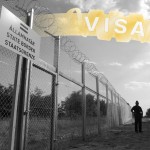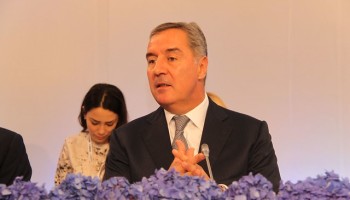It was enticing, at least for people with money to burn: a chance to mingle with marquee names like actor Robert De Niro or Haitian rapper Wyclef Jean at a two-day “global citizenship forum” on a beautiful resort island in the Adriatic Sea.
About 400 people thought so, anyway, flocking to Montenegro’s Sveti Stefan in October 2017. Among them were two prime ministers and the chief executive officer of the World Bank, as well as assorted business leaders, politicians, tourism officials, accountants, and lawyers.
The event was sponsored by Arton Capital, one of a handful of multinational firms that specializes in global citizenship-by-investment programs, commonly known as Golden Visas.
“This is about being part of a global community where everybody helps each other,” De Niro told the crowd. “That may sound altruistic, but that’s the point.”
Well, to an extent.
All that Glitters…
The citizenship-by-investment industry is a multi-billion-dollar global phenomenon that helps those with money obtain residence permits or even citizenships by agreeing to invest specified amounts in their “new” countries. The required amounts aren’t small, ranging from a few hundred thousand euros to as much as €10 million.
And while many may simply want the convenience of visa-free travel to destinations like the US or European Union (EU), others have darker motives such as tax avoidance, money-laundering, or dodging prosecution in other jurisdictions.
More than 20 countries offer some version of this option, stressing different selling points, while others, such as Armenia, may be next. Among them is Montenegro, a mountainous country about half the size of Israel that lies along the crystalline Adriatic Sea, facing the heel of Italy’s boot.
With a population of just 630,000, Montenegro is famous for dramatic mountains, clean rivers, and picturesque coastline. It’s also infamous for its deep-rooted, systemic corruption and close ties between politics and organized crime.
Since the country gained independence in 2006, its governments have actively sought foreign investment, especially along the coast.
In fact, Montenegro’s Prime Minister Dusko Markovic thought the two-day Sveti Stefan forum so important that he attended nearly all of its events.
“We need this program to provide for a fresh influx of cash into the country,” he told the crowd. Markovic said that Montenegro wants to accelerate its economic development, and to that end, the country must “create some sort of distance from the negative heritage of [its] past, and move towards western values, the values of western Europe.”
Come on in, the Water’s Fine
Critics say that in recent years, Montenegro has not been overly particular about who gets a passport.
Perhaps the highest-profile “new” Montenegrin is Thaksin Shinawatra, the former prime minister of Thailand, who fled his country in 2008 and was subsequently convicted of corruption. Although Montenegro had no Golden Visa program at the time, Shinawatra was granted citizenship and a passport in 2010 in return for promised investments.
That same year, the government announced plans for an “economic citizenship program” that would provide Montenegrin citizenship in exchange for an investment of at least €500,000 in the country. Officials in Brussels were so alarmed at the idea they told Montenegro it was risking its chances of joining the EU and gaining visa-free access to Schengen countries.
The plan was shelved — but only temporarily, as it turns out.
Shinawatra did deposit €15 million in an account with the First Bank of Montenegro, and what occurred next sheds light on how things work in Montenegro. The bank was majority-owned by Aco Djukanovic, the brother of then-prime minister Milo Djukanovic. As it happened, the bank was desperate for cash at the time Shinawatra made his deposit.
It wasn’t until April 2017 that Shinawatra made an actual investment in another Adriatic jewel: St. Nicolas’ Island, on the most popular part of the Montenegrin Riviera.
Shinawatra paid a whopping €24 million for a plot about the size of four football pitches. The seller was Stanko Cane Subotic, a close friend of Milo Djukanovic. Subotic had bought the land in 2007 with the help of a loan provided by Aco Djukanovic’s very same First Bank of Montenegro.
Along with the Djukanovic brothers and members of the Sacra Corona Unita crime family, Subotic was charged with cigarette smuggling in Italy in the 1990s, though the high-profile case fell apart over the years as Italian prosecutors changed.
Now plans for the development of Shinawatra’s new plot are being drawn up — by a company owned by none other than Aco Djukanovic.
Despite the shelving of the 2010 Golden Visa plan, several other investors followed in Shinawatra’s footsteps, becoming “honorary citizens” due to their allegedly invaluable contributions to the future economic prosperity of a Montenegro its officials like to call “the future Monaco.”
Very Important Citizens
According to the country’s law on citizenship, a person of “special importance” to Montenegro’s scientific, economic, cultural, athletic or other interests, can be granted “honorary” citizenship if approved by the Ministry of the Interior.
Critics say that some questionable people have been granted citizenship based on the promise of future investment, while their positive influence on the economy was limited to the acquisition of luxurious apartments, mostly on the coast.
An early beneficiary of this policy was Mohammed Dahlan, the former Palestinian minister for security, who received his Montenegrin passport in 2010 just as the public learned that he was accused of embezzling state funds in Palestine. (Dahlan, who represented himself as an “unofficial contact” to circles of Middle Eastern investors, obtained Serbian citizenship as well in 2015).
As in the Shinawatra case, the justification for his Montenegrin citizenship was vague and imprecise, with no public information provided regarding his role as partner or even promoter of any investments in Montenegro.
Another controversial new Montenegrin is Wei Seng “Paul” Phua, a Malaysian billionaire who was arrested in 2014 for organizing illegal gambling in the US. Phua is a gambling czar whose businesses extend from Hong Kong, Melbourne, Las Vegas, and London to Montenegro. After several months in custody, a US court released Phua, ruling that the FBI had illegally obtained evidence against him.
According to the US Department of Justice court filings, Phua was a senior member of a Hong Kong criminal group known as the 14K triad (Phua's legal representatives dispute the allegation); testimony under oath also indicated that officials of Las Vegas-based Caesars Palace were suspicious of funds he had transferred within its establishments.
According to a local report, Phua obtained Montenegrin citizenship sometime in 2013 or 2014.
In Montenegro, he formed a partnership with Petros Stathis, originally of Greece, who also obtained Montenegrin citizenship on the basis of special economic interests and has made multiple investments in the country. Stathis currently leases or owns some of the most valuable parts of the Montenegrin coast, including Sveti Stefan itself, and also owns a few domestic media outlets.
Phua and Stathis’ joint business concerns in Montenegro involve banking and Sveti Stefan.
The non-governmental organization MANS, an OCCRP partner and affiliate of Transparency International, filed a criminal appeal in 2012 against Stathis for multiple violations of laws in his leases of Montenegrin coastal sites. The appeal also alleges that state officials violated the law in approving these deals.
MANS alleges that in 2010, Stathis illegally built two laundry facilities near Sveti Stefan without obtaining any building permits. The structures were designated as “temporary,” though they were built of rock and concrete.
Another new Montenegrin citizen is Hadi Marwan Awde, a Libyan who, along with his spouse, obtained citizenship in 2014 based on a recommendation from prime minister Dusko Markovic.
In 2014, Markovic, who was then vice president, asserted Awde was “of special significance to the state” because he coordinated the activities of the president and board of directors of the Al Qudra Group of the United Arab Emirates.
Markovic said Awde had contributed significantly to the company’s “focus on investments in Montenegro” and that is he is expected to build a tourist complex on the seaside and develop the country’s medical tourism industry.
According to the Montenegrin Registry of Companies, Awde is a director of the domestic branch of Al Qudra Group, which describes itself as “one of the leading strategic investors based in the emirate of Abu Dhabi” and is involved in oil, banking, finance, healthcare and project management.
However, the company so far has made no apparent investments in Montenegro. It has no land registered in its name, nor has it submitted any annual accounts to the Montenegrin tax authority since its creation in 2014.
Some strategic investors who gained honorary citizenship did make significant investments. Samih Sawiris is currently investing in the Lustica Bay project, a luxury resort which employs some 44 people. Ahmet Erentok, president of the Board of Directors of Azmont Investments, is building Porto Novi — another large coastal project — and has more than 50 employees in several Montenegrin companies.
In 2015, Australian Romy Hawatt became a Montenegrin citizen, citing the investments made by his four companies which already operate in tourism and aeronauticals. Hawatt currently employs around 25 people. (See: Romy Hawatt Interview)
In 2014 and 2016, Milo Djukanovic proposed two other investors as potential new Montenegrin citizens: American Bobby Lynn Hayes and Russian Igor Bidilo.
Hayes bought properties in Porto Montenegro, a luxury housing complex, and also owns a company that employs two people but has recorded only losses. Bidilo has also invested in real estate in Tivat, a small city in the Bay of Kotor, and has hired one person. Bidilo’s company recorded a profit only in 2016, while previously operating at a loss.
Beyond the Silver Linings
In 2016, Montenegro revived its earlier campaign to institute a Golden Visa program. After several tenders offered by the Ministry for Sustainable Development and Tourism failed to attract bids, the government took more extreme measures.
Montenegrin authorities invited all companies interested in drawing up a new investor-citizenship program to submit ideas and concepts; two did. A final draft is expected to be introduced soon.
Cornelia Abel, the regional coordinator for Europe and Central Asia at Transparency International, warns that such programs can come with serious downsides.
“One has to be very careful with such programs, as they are often and very easily abused,” she says. “An extreme case can be seen in Hungary, where the profits from such a program do not benefit the country,” but travel via offshore tax havens into unknown pockets. In other cases, said Abel, the programs are “so badly organized that they support the influx of criminals into a country, thus potentially fostering terrorism and increasing insecurity.”
To avoid problems, she says, Montenegro’s new legislation should require thorough screening of every applicant and an investigation of the source of their money to prevent money laundering.
Abel stressed it was also critical to ensure that the proposed investment “benefits the country, not single interests.”
Abel noted that lax standards can promote terrorist activities, which would only hurt Montenegro’s aspirations to join the EU. Countries seen as dangerous, she said, “are often sanctioned or excluded. It would definitely mean a setback.”

With reporting from Christian Salewski and Johannes Edelhoff of ARD Panorama in Germany and Montenegro.
This story was produced as part of the Global Anti-Corruption Consortium, a partnership between OCCRP and Transparency International.







